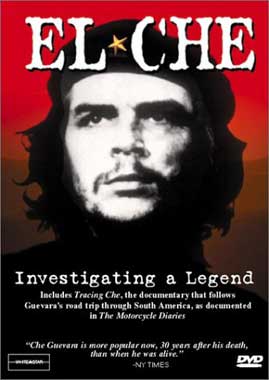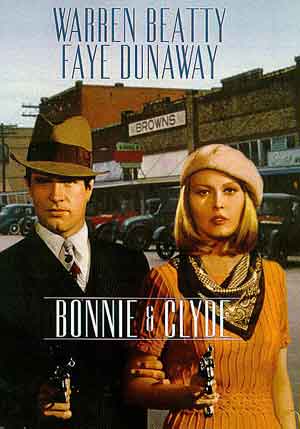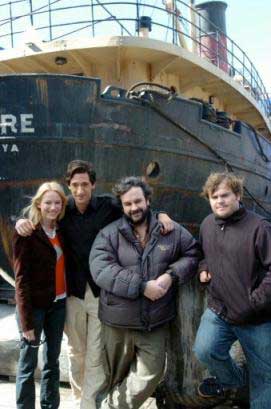There’s a vaguely bothersome echo in Walter Salles’ The Motorcycle Diaries (Focus Features, 9.24) that nobody in Hollywood journalist circles seems to want to talk about…but it’s there.
It doesn’t trouble me to any great degree, although it’s grown into a slight roadblock in terms of my core feelings about the lead character, Ernesto “Che” Guevara, who is wonderfully played by Gael Garcia Bernal.
The echo I’m speaking of certainly has no place in Diaries itself, which is essentially a young man’s film about the growing of a heart. The story is about the socio-political awakening of Guevara over the course of a road trip he took across South America with a friend, Albert Granado (Rodrigo de la Serna), in 1952.
Diaries isn’t about politics or dogma, but compassion. The invisible sub-heading is not “How I Became a Communist” but “How I Happened to See Beyond Myself and Realize How Badly People are Hurting.”

But Salles’ film tells only a little bit about who Guevara was in ’52, and nothing at all about what he would soon become.
Guevara’s Diaries adventure happened only two and a half years before he hooked up with Fidel Castro in Mexico, about three years before he sailed to Cuba to join the revolution, and only about seven years before Guevara was organizing hundreds of firing-squad executions in the wake of Castro’s Cuban takeover.
The Motorcycle Diaries is about a young man finding his humanity, but as Guevara got older and tougher his life seemed to be less about caring than anger, vengeance and a Marxist philosophical purity that seems fairly bizarre by today’s standards.
In the movie Guevara flirts with various women, shows kindness to strangers, and cares for lepers in a hospital along the Amazon. He’s an unequivocal sweetheart.
In real life Guevara was a hard-core cadre who apparently came to believe more and more in black and white moral extremes. Oppressors bad, revolutionaries good, etc. Hate, it seems, was as much of a driving force in his life as love, and perhaps a bit more so.
In a 1967 speech, he said the following: “Hatred is an element of struggle; relentless hatred of the enemy that impels us over and beyond the natural limitations of man and transforms us into effective, violent, selective, and cold killing machines. Our soldiers must be thus; a people without hatred cannot vanquish a brutal enemy.”

El Che
A taste of this side of Guevara comes through in a DVD documentary called El Che: Investigating a Legend (White Star Video). Initially released in April 2003, it offers a standard account of Guevara’s life with lots of good newsreel footage, plus a bonus doc about some guy trying to relive Guevara’s 1952 adventure on a trek along the same path.
I’m not saying the primary doc is first-rate, but it’s passable. It’s got lots of footage of Guevara in all his incarnations. It has several friends and comrades talking about him at length. And it offers a reasonably intelligent understanding of what his life amounted to and how it all went down.
You can’t watch El Che without thinking two things.
One is that The Motorcycle Diaries, as sublime as it is on its own terms, deals with Che Guevara’s life and legend in the same way a doc about George Bush’s years as a boola-boola Yale student would probably explain why he decided to hang out with his father’s friends, decimate the surplus handed to him by the Clinton administration, and become a “war president.” Which is to say, a little but not much.
The second is that Steven Soderbergh’s Che, based on a script by Terrence Malick and focusing on Guevara’s revolutionary years, right up to his shooting death at the hands of Bolivian solders, is going to be a much darker piece.
This film will apparently follow Guevara from Mexico in the mid ’50s to Cuba to the Congo, and finally to Bolivia, where Guevara met his fate in late 1967.
I got one other thing from El Che. Revolutions are bloody affairs and a lot of Batista loyalists were put to death upon Guevara’s orders, but for better or worse the man was a serious revolutionary. He believed enough in his ideals to die for them.
Hablo Americano
Everyone spoke Spanish in the Mexican portions of Steve Soderbergh’s Traffic, and that seemed to most of us like the right and natural way to go. But a director friend has told me the plan with Soderbergh’s Che is to shoot it in English, and that sounds a bit strange. In fact, I’m having trouble accepting this.
Can you imagine a Soderbergh film about Che Guevara with everyone talking in Spanish-inflected English, like Jack Palance and Omar Sharif did in Richard Fleisher’s 1969 Che? No, no….can’t be right. Too surreal.


Steven Soderbergh, Benicio Del Toro
But then what U.S.-based producer is going to cough up a portion of $40 million (the alleged budget) for a film that’s almost entirely Spanish-speaking?
Don’t misunderstand — I’d be there in a second. I’m hoping Soderbergh does shoot it in Spanish. I’m just wondering about the Average Joes.
Focus Features is listed as the U.S. distributor. A small group of foreign-based investor-producers, including Brazil’s Morena Filmes and France’s Wild Bunch, are pooled on this thing.
If and when Che happens (it’s supposed to roll in August of ’05), Benicio del Toro will plays Che and Javier Bardem will play Fidel Castro. Benjamin Bratt, Ryan Gosling and Franka Potente will costar.
Looking for Girls
Too many guys read Hollywood Elsewhere…no, wrongly put. I’m saying I don’t have enough women readers. Only about 10%, when you get right down to it. This is partly my fault. Okay, mostly. My taste in movies is too Michael Mann-ish, I suppose, and I don’t have a knack for reaching into women’s souls with my prose.
I don’t want this state of affairs to continue. This would be a more interesting site if more women took part. It really would. So here’s the deal: I’m offering a regular weekly column on this site to any woman film critic or Hollywood columnist who wants to try for the gig. Really.
But (a) you have to be at least moderately on the young side (i.e., no 58 year olds), (b) you have to know how to write as well as Veronica Geng, Stephanie Zacharek or Pauline Kael, or an approximation thereof, (c) you have to know this town fairly well, and (d) you have to promise me you won’t quit after four or five months like Patricia Vidal did with David Poland after she met some guy, etc.
All you have to really be is good. Good enough, I mean, to get hired away from this site after a year or so by some employer whose terms I won’t be able to match.
Recants
Every film critic or regular moviegoer has gone through some kind of reappraisal about this or that film from time to time.
Some aren’t honest enough to admit to an occasional modification. But to change one’s mind (or to admit you weren’t paying enough attention the first time, or that you were having an off day) is totally allowable….as long as you’re generally resolute in your views. After all, there are a lot of Zelig’s out there.
When I first saw Eyes Wide Shut, I called it intriguing, stimulating, first-rate… and that I was particularly looking forward to subsequent viewings, as all Kubrick films get better and better the more times you see them. But it didn’t happen. EWS got a little bit worse every time I re-saw it.
(And yet, oddly, it’s an absorbing film. I’ve always been susceptible to the simple scene-to-scene experience of just “watching” it, even if it doesn’t add up to much.)
I feel nothing but shame for having written a qualified rave of Tim Burton’s Planet of the Apes, which I did in this space. I was wrong, wrong…terribly wrong.

One of the most famous critical turnabouts happened in response to Stanley Kubrick’s 2001: A Space Odyssey, which was fairly heavily trashed by most mainstream critics when it opened in April 1968. But by the end of the summer, after the film had caught on with stoned audiences as a kind of new-wave mystical experience film, a few critics wrote mea culpas.
That same year, Andrew Sarris, the Jefferson of auteurism, put Stanley Kramer’s Guess Who’s Coming to Dinner on his ten-best list. He later apologized, saying that “I want only to forget.”
New York Times critic Bosley Crowther tore into Bonnie and Clyde when it first came out in the spring of ’67. He called it “a cheap piece of bald-faced slapstick comedy that treats the hideous depredations of [this] sleazy, moronic pair as though they were as full of fun and frolic as the jazz-age cutups in Thoroughly Modern Millie.”
Crowther would have done well to take another look with a fresh eye after Bonnie and Cluyde‘s re-release a few months later (pushed through by star-producer Warren Beatty)…but he didn’t. The film went on to become a bona fide classic.
I asked some critic friends about this syndrome on Monday. I understand why only a few of them wrote back. Nobody wants to show their soft white underbelly, especially to their editors.
Roger Ebert says he “recently upgraded Donnie Darko from 2.5 to 3 stars, and The Brown Bunny from worst ever to three stars, but both reviews were based on revised versions of the films.” (Nearly a half hour of dead air was removed from the version of Bunny that was shown at the ’03 Cannes Film Festival.) But these are fresh looks, not turnarounds.

Roger Ebert, Andrew Harris, Luke Thompson
Seattle Weekly and L.A. Weekly critic Tim Appelo admits to some regrets, among them a rave in The Oregonian for Jim Carrey’s Batman Forever performance as ‘the Riddler.’
“[A local exhibitor] told me that every star I awarded a film to represented $5,000 in revenue, because the O is a monopoly paper,” Appelo recalls. “And my $25,000 five-star review of Batman Forever almost got me lynched by maybe 10% of my readers. What can I say? I was new to the Alex-in-A-Clockwork-Orange-like plight of the daily newspaper reviewer, and so dazzled by the eerieness of Carrey’s talent that I saw what I wanted and what was not there.”
“And the fact is, if you don’t sometimes change your mind about a movie, you’re out of your mind. Pauline Kael, who refused to see movies twice and falsely claimed to remember them all entirely, was so confident in her stone-inscribed opinion that she would cut off a friendship for life if anybody dared disagree with her on a single film, even if she helped launch their careers (e.g., Owen Gleiberman).”
Los Angeles-based critic Luke Thompson says that “almost every critic will tell you they’ve since thought better of praising Forrest Gump. This partly has do with the [political] baggage it picked up. I didn’t especially think of Gump as a condemnation of the ’60s counterculture at first, but that became what a lot of people latched onto, and indeed, it’s there, and repellant.
“Kevin Smith is someone I’ve seriously had to rethink,” says Thompson. “His recent output is so feeble that it makes me question what came before. I’m pretty sure I’d still like Mallrats — which I related to because it resembled my own teen years spent in malls — but I have my doubts about Clerks, and I’ve definitely thought better of Chasing Amy.”
Variety critic Robert Koehler feels he was “much too harsh on Jean Luc Godard’s King Lear, in my analysis in the Los Angeles Times at the time of its very brief theatrical release. I misunderstood it as Godard’s analysis of ‘Lear,’ when it was actually a kind of meta-documentary on Godard’s filmmaking practice at that point in his home in Rolle, Switzerland.

“I think now that Godard’s Lear is not only one of the more valuable of his works from the ’80s, but one of the more original re-thinkings of Shakespeare on film –Shakespeare completely absorbed into the modern world, the way Heiner Muller did on the German stage.
“I also remember hating Antonioni’s L’Avventura on my first viewing as a teenager….but, of course, you would hate this film as a teen! Only when I was in college a couple of years later did I get it, and it was a major epiphany. Which is perhaps why it remains my favorite film.”
“A director who was once (and remains) hip to dismiss is Claude Lelouch, and I used to place him in the ‘ignore’ file. But Lelouch’s work is pretty glorious over time — silly, but divinely silly, rapturously silly. Giddy movies at their giddiest.”
All right, that’s it. I draw the line at anyone blowing kisses to Claude Lelouch. I just lost it for a minute there…sorry. Go for it, Bob. Whom else do you like? Mervyn LeRoy?
“It’s important to consider that films work on emotions and are therefore by nature offer different payoffs on multiple viewings,” says DVD Newsletter editor Doug Pratt. “There are times when the New Age optimism in Easy Rider seems laughably naive, and other times when that aspect of the film is less important than how well the film captures the spirit of the [late’60s counter-culture].
“In fact, Jack Nicholson’s ‘they’re afraid of what you represent’ speech gets to the heart of your red state vs. blue state quandary better than any analysis I’ve ever seen.”
The Outfit
“I totally agree about wanting to see a DVD of The Outfit, easily one of the finest B-movies ever made, in my humble opinion at least. The fact that some horrible films are getting the special-edition treatment when fantastic films like this are ignored is criminal. Even a bare-bones release would be something, just so long as I have the film in my collection.
“Ditto for Point Blank, which is John Boorman’s finest work and a brilliantly structured exercise. Surely somebody somewhere is working on a special edition? What does it say about industry priorities when that Mel Gibson atrocity Payback , a remake of Point Blank, is in circulation all over and this vastly superior original only gets an airing on Turner Classic Movies?
“Point Blank and The Outfit are both based on Richard Stark books, and in fact are both about the same character, who in the books is called Parker.” — Martin Stanley
Vistors Wanted
Joseph Kay’s piece in the current VISITORS column is tightly edited, nicely laid out and getting good play. If any of you want to be next week’s guest columnist, you know what to do. Send your submissions to me by Friday morning, please. Thanks.

Should Hollywood Elsewhere inaugurate a special ongoing column called Kong Watch, dedicated to the apparent likelihood that Peter Jackson’s film has the earmarks of something woefully misbegotten? I shouldn’t, you’re all saying? Cool the anti-Jackson rant? Okay, you’ve talked me out of it. But what should I put in place of the soon-to-be-discarded Word column?












